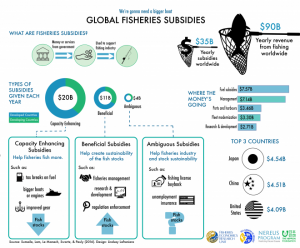At this very moment, fishing is occurring on a massive scale across the globe. Unfortunately, one third of all global fisheries are unsustainable at current rates of extraction (Hall, 2019). Although there are many factors that contribute to this concerning statistic, government subsidies are seriously harming the health of our fish stocks and ecosystems worldwide (Hall, 2019).
For those who need a bit of a refresher, subsidies can be described as government contributions to an industry made in the hope of promoting its profitability (Munro & Sumaila, 2002). In the fishing industry, these subsidies can come in the form of income support, tax exemptions, lowered fuel prices, investments in infrastructure, and/or gear modernization (just to name a few)(Munro & Sumaila, 2002). Unfortunately, these subsidies are not working very well. In fact, although the global fishing industry rakes in $90 billion dollars in revenue per year (Fisheries Economics Research Institute, UBC Global Fisheries Cluster, The Nippon Foundation, 2016), once subsidies and operating costs are taken into consideration, the industry actually operates at a loss of $44 billion dollars every single year (Hall, 2019). Government subsidies are pushing the global fishing industry to invest more and more effort into exploiting stocks that are become increasingly scarce; this dramatically decreases efficiency (Sala et al. 2018).

(Fisheries Economics Research Institute, UBC Global Fisheries Cluster, The Nippon Foundation, 2016)
So why are fishers still fishing if the industry is operating at a loss? Unfortunately, although the industry as a whole is massively economically inefficient, subsidies make it so that fishing remains profitable for each individual operator (Sala et al. 2018). This concept is fairly complex economically, but this video offers a good explanation (Conservation Strategy Fund, 2015).
Even more concerningly, artificially high fishing incentives have resulted in stocks being exploited at rates that far exceed their ability to regenerate (Sala et al. 2018). Not only is this concerning for ecological reasons, but diminishing stocks can eventually lead to the collapse of entire fisheries (and the subsequent loss of all the related jobs). When subsidies are present in common pool fisheries (aka the entirety of the high seas), this problem only worsens. If one boat abstains from harvesting a particular stock, another boat will almost certainly harvest it (and receive the revenue along with it). Knowing this, there is no incentive for any one operator to preserve the health of a shared stock into the future (Munro & Sumaila, 2002). As a result, operators race to harvest as much as they possibly can.
Luckily there is hope. World Trade Organisation members are currently meeting with the aim of reaching an international agreement on reducing damaging fisheries subsidies. This is incredibly encouraging news. Improvements in this industry could result in $83 billion of economic gains (Hall, 2019). In combination with an expansion of marine reserves, financing innovation, and improved enforcement, subsidy reform could also dramatically reduce the pressure our global fish stocks face and create a healthier and more productive ocean for all (Sala et al. 2018). To sum up the potential of subsidy reform and remind ourselves of the wonders of what we are trying to protect, take a look at this David Attenborough video (World Economic Forum, 2019).
References
Conservation Strategy Fund. (15/01/15). Fisheries Economics & Policy: Subsidies and Taxes [https://youtu.be/YsDvxir7YsI]. Retrieved from https://www.youtube.com/watch?v=YsDvxir7YsI&t=123s
Fisheries Economics Research Institute, UBC Global Fisheries Cluster, The Nippon Foundation (2016). [Graphic illustration]. Global Fisheries Subsidies. Retrieved from http://archives.nereusprogram.org/ask-an-expert-why-is-the-global-fishing-industry-given-35-billion-in-subsidies-each-year/
Hall, M. (2019). Global Trade Deal Needed Urgently to Ban Subsidies Threatening Fish Stocks. Retrieved from https://www.weforum.org/press/2019/10/global-trade-deal-needed-urgently-to-ban-subsidies-threatening-fish-stocks/
Munro, G., & Sumaila, U. R. (2002). The impact of subsidies upon fisheries management and sustainability: The case of the north atlantic. Fish and Fisheries, 3(4), 233-250. doi:10.1046/j.1467-2979.2002.00081.x
Sala, E., Mayorga, J., Costello, C., Kroodsma, D., Palomares, M., Pauly, D., . . . Zeller, D. (2018). The economics of fishing the high seas. Science Advances, 4(6), eaat2504. doi:10.1126/sciadv.aat2504
World Economic Forum. (19/10/08). David Attenborough Explains What We Need to Do to Stop Over-Fishing [https://youtu.be/og8N-EslUPQ]. Retrieved from https://www.youtube.com/watch?v=og8N-EslUPQ